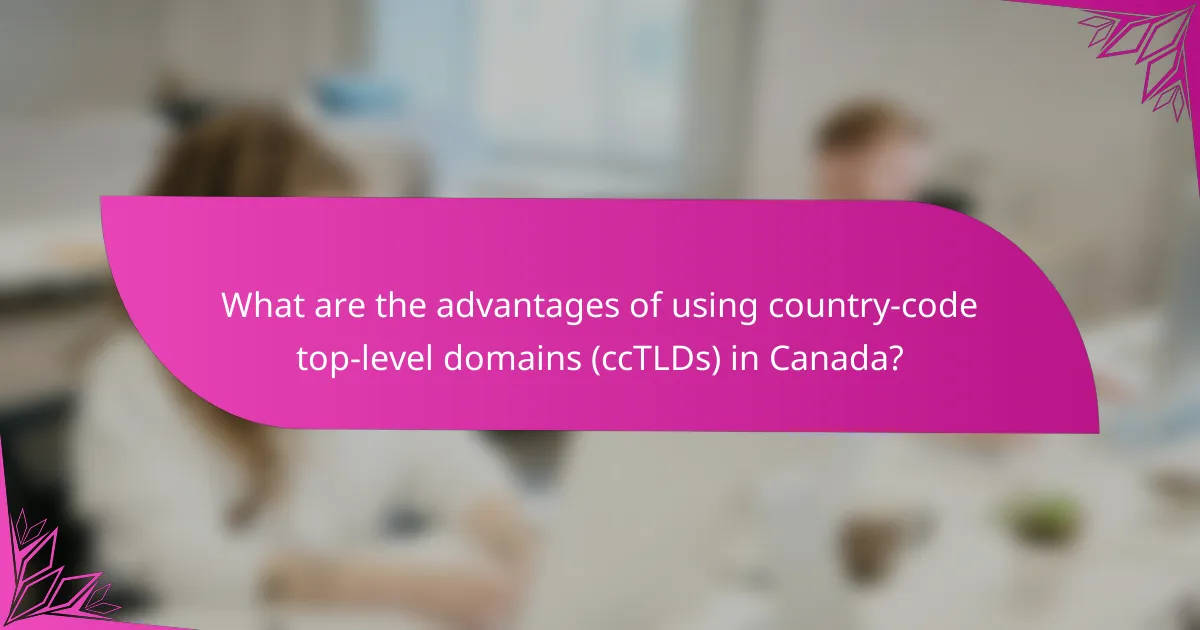Choosing the right domain extension is crucial for Canadian businesses, as it can enhance brand visibility, credibility, and local relevance. Options like .com, .ca, .biz, and .org serve different purposes and can influence SEO, user trust, and click-through rates. By considering target audience, brand identity, and legal restrictions, businesses can make informed decisions that positively impact their online presence.

What are the best domain extensions for Canadian businesses?
The best domain extensions for Canadian businesses include .com, .ca, .biz, and .org, each serving different purposes. Choosing the right extension can enhance your brand’s visibility, credibility, and local relevance.
.com for global reach
The .com domain extension is the most recognized and widely used globally, making it ideal for businesses aiming for a broad audience. It conveys professionalism and trust, which can be crucial for attracting customers both domestically and internationally.
When selecting a .com domain, ensure it is easy to remember and spell. Shorter names tend to perform better, and incorporating relevant keywords can boost search engine optimization (SEO). Avoid using numbers or hyphens, as these can confuse potential visitors.
.ca for local identity
The .ca domain extension is specifically designed for Canadian businesses and organizations, emphasizing a local presence. This can help build trust among customers who prefer to support local enterprises.
When using a .ca domain, consider incorporating your city or province in the name to further enhance local relevance. This can improve your visibility in local search results and attract customers who prioritize supporting local businesses.
.biz for business focus
The .biz domain extension is tailored for businesses, particularly those that may not secure their desired .com name. It clearly indicates a commercial intent, making it suitable for small to medium-sized enterprises.
While .biz can be a good alternative, it’s essential to ensure that your branding remains strong. Pairing it with effective marketing strategies can help establish credibility, as some users may still prefer traditional extensions like .com.
.org for non-profit organizations
The .org domain extension is primarily used by non-profit organizations, charities, and educational institutions. It signifies a commitment to a cause, which can foster trust and support from the community.
If your business operates as a non-profit, using a .org domain can enhance your credibility and appeal to potential donors. Ensure that your website clearly communicates your mission and values to engage visitors effectively.

How does a domain extension affect SEO?
A domain extension can significantly influence SEO by impacting search rankings, user trust, and click-through rates. Choosing the right extension helps align your business with user expectations and search engine algorithms.
Impact on search rankings
The domain extension you choose can affect your website’s visibility in search engine results. While search engines like Google do not prioritize extensions directly, they may consider the relevance of the extension to the searcher’s intent. For example, a .com or .org extension may be favored for general businesses, while a .edu extension is typically reserved for educational institutions.
Additionally, local extensions like .ca can help businesses target Canadian audiences more effectively. This can enhance local SEO efforts, as search engines may prioritize websites with local relevance in their results.
User trust and click-through rates
User trust is crucial for click-through rates, and the domain extension plays a role in this perception. Familiar extensions like .com or .org are often viewed as more credible, while less common extensions may raise skepticism among users. A trustworthy domain can lead to higher click-through rates from search results.
To improve user trust, consider using a recognized extension that aligns with your business type. For instance, if you are a nonprofit, a .org extension may resonate better with your audience. Always prioritize extensions that convey professionalism and reliability to enhance user engagement.

What factors should Canadian businesses consider when choosing a domain extension?
Canadian businesses should consider their target audience, brand identity, and any legal restrictions when selecting a domain extension. These factors can significantly impact online visibility, customer perception, and compliance with regulations.
Target audience and location
Understanding your target audience is crucial when choosing a domain extension. For businesses primarily serving Canadian customers, a .com or .ca extension may enhance local recognition and trust. If your audience is international, consider a more global extension like .net or .org.
Additionally, consider regional extensions if your business operates in specific provinces or cities. For example, .toronto for Toronto businesses can help localize your brand and attract nearby customers.
Brand identity and recognition
Your domain extension should align with your brand identity to foster recognition and credibility. A .com extension is often perceived as more professional and trustworthy, making it a popular choice for many businesses. However, unique extensions like .tech or .design can help differentiate your brand in niche markets.
When selecting a domain, ensure it reflects your business values and resonates with your audience. A memorable extension can enhance marketing efforts and improve recall among potential customers.
Legal implications and restrictions
Different domain extensions may come with specific legal implications and restrictions. For instance, .gov is reserved for government entities, while .edu is limited to accredited educational institutions. Ensure that your chosen extension does not violate any regulations that could lead to legal issues.
Additionally, be aware of trademark considerations. Using a domain extension similar to a well-known brand could lead to disputes. Conduct thorough research to avoid potential conflicts and protect your business’s online presence.

How do different domain extensions compare in pricing?
Domain extensions vary significantly in pricing, influenced by factors such as popularity, demand, and registration requirements. Generally, traditional extensions like .com are more affordable, while specialized or premium extensions can be considerably more expensive.
.com pricing trends
The .com domain extension remains the most popular choice for Canadian businesses, typically costing between $10 and $20 per year for standard registrations. Prices can fluctuate based on the registrar and promotional offers, but renewal rates often align closely with initial registration costs.
Businesses should consider the long-term value of a .com domain, as it is widely recognized and trusted by consumers. Investing in a .com can enhance brand credibility and visibility online.
.ca registration costs
The .ca domain extension is specifically designated for Canadian entities, with registration costs generally ranging from $10 to $30 per year. This extension can be an excellent choice for businesses looking to emphasize their Canadian identity.
However, to register a .ca domain, the entity must meet specific eligibility requirements, such as being a Canadian citizen or a business operating in Canada. This can limit access for some international businesses.
Premium domain extensions
Premium domain extensions, such as .tech, .design, or .store, can vary widely in price, often starting from $30 and reaching into the hundreds or thousands of dollars for highly sought-after names. These extensions are typically chosen for their relevance to specific industries or niches.
When considering premium domains, businesses should weigh the potential benefits against the costs. A unique extension can help a brand stand out, but it’s essential to ensure that the investment aligns with overall marketing strategies and target audience recognition.

What are the advantages of using country-code top-level domains (ccTLDs) in Canada?
Using country-code top-level domains (ccTLDs) in Canada can enhance local visibility and credibility for Canadian businesses. These domain extensions, such as .ca, signal to both search engines and consumers that a business is locally focused, which can lead to improved search rankings and customer trust.
Local SEO benefits
ccTLDs can significantly boost local search engine optimization (SEO) efforts. Search engines often prioritize local results for users, and having a ccTLD can help your website rank higher in local search queries. This is particularly beneficial for businesses targeting specific regions or communities within Canada.
For example, a business using a .ca domain may perform better in local searches compared to a generic .com domain. This localized approach can lead to increased website traffic from potential customers in your area.
Consumer trust in local brands
Consumers tend to trust businesses that appear to be locally rooted. A ccTLD can enhance this perception, making customers feel more comfortable engaging with a brand that clearly identifies with their community. This trust can translate into higher conversion rates and customer loyalty.
Additionally, using a ccTLD can differentiate your brand from competitors who may not prioritize local presence. This distinction can be particularly advantageous in crowded markets, where establishing trust is crucial for attracting and retaining customers.

What are the emerging trends in domain extensions for Canadian businesses?
Canadian businesses are increasingly adopting new domain extensions to enhance their online presence and brand identity. Emerging trends include the rise of new generic top-level domains (gTLDs), the growing importance of brandable domains, and the evolving relevance of domain extensions in digital marketing strategies.
Rise of new gTLDs
The introduction of new gTLDs has expanded the options available for businesses looking to establish a unique online identity. These extensions, such as .tech, .design, and .shop, allow companies to align their domain with their industry or niche. This specificity can improve search visibility and attract targeted audiences.
When choosing a gTLD, consider how well it reflects your brand and resonates with your target market. For example, a tech startup might benefit from a .tech domain, while an e-commerce site could opt for .shop to clearly indicate its purpose.
Impact of brandable domains
Brandable domains are increasingly favored by businesses seeking to create memorable online identities. These domains often consist of unique, invented words or phrases that are easy to pronounce and spell, making them more recognizable. A strong brandable domain can enhance marketing efforts and improve customer recall.
To select a brandable domain, focus on simplicity and relevance. Avoid overly complex names and ensure that the domain aligns with your brand values. For instance, a domain like “GadgetFlow.com” could effectively convey a tech-oriented business’s mission.
Future of domain extension relevance
The relevance of domain extensions is shifting as consumer behavior evolves and digital marketing strategies become more sophisticated. While traditional extensions like .com remain popular, newer options may gain traction as businesses seek differentiation in crowded markets. Companies should stay informed about trends to ensure their domain choices remain effective.
As you plan for the future, consider how emerging technologies, such as voice search and AI, may influence domain extension effectiveness. Regularly reassess your domain strategy to adapt to changing consumer preferences and technological advancements.
